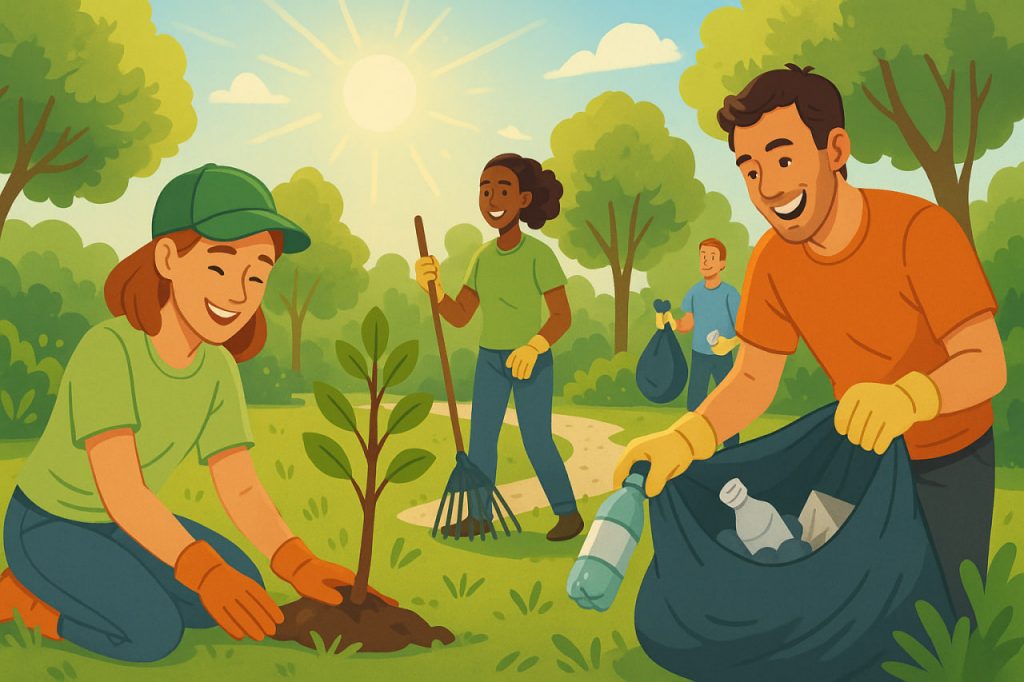Community clean-up days—known in many countries as subbotniks—are much more than a social tradition; they are an activity that unites people, restores nature, and improves health. These volunteer events, where citizens gather to clean parks, beaches, and public spaces, provide both physical exercise and mental satisfaction. In a time when many lead sedentary, urban lifestyles, participating in such activities offers a simple yet powerful way to improve one’s body, mind, and environment at the same time.
Physical Health and Active Living
Subbotniks involve a variety of physical tasks such as raking, lifting, sweeping, planting, or collecting trash—all of which engage multiple muscle groups and promote physical activity. Unlike structured exercise, these movements occur naturally and purposefully, helping burn calories and strengthen the cardiovascular system. Even a few hours of outdoor labor can boost endurance, flexibility, and posture. Moreover, exposure to sunlight during these activities increases vitamin D levels, which supports bone health and immune function.
Mental Well-Being and Stress Relief
Participating in community clean-up efforts can have profound effects on mental health. Studies have shown that outdoor volunteering reduces stress hormones, improves mood, and enhances feelings of purpose. Physical activity in green spaces helps release endorphins, the body’s natural “happiness chemicals,” which counteract anxiety and depression. The act of contributing to a shared goal also strengthens a sense of belonging and accomplishment—key factors in emotional resilience and self-esteem.
Strengthening Social Bonds
Subbotniks bring together people from all walks of life—neighbors, students, families, and co-workers—who may not normally interact. Working side by side fosters communication, trust, and mutual respect. These social connections are vital for mental health and can reduce feelings of loneliness, which has been identified as one of the major health risks of modern society. A few hours spent cleaning a park together often lead to friendships, teamwork, and stronger community cohesion long after the event ends.
Connection with Nature
Modern lifestyles have distanced many people from nature, yet contact with natural environments plays a critical role in well-being. Subbotniks provide an opportunity to reconnect with the earth—feeling the soil, hearing birds, and breathing fresh air. Such experiences lower blood pressure, improve concentration, and promote relaxation. Psychologists call this effect “biophilia”—the human tendency to seek connection with the natural world. Even a simple act like planting trees or cleaning a riverbank helps participants feel more grounded and balanced.
Environmental and Psychological Synergy
There’s a unique harmony between helping the planet and helping oneself. When people see the direct results of their actions—cleaner surroundings, restored greenery, or reduced pollution—it reinforces their sense of agency and optimism. This feeling combats helplessness often associated with global environmental problems. Cleaner surroundings also mean healthier communities, as reduced waste lowers risks of allergies, infections, and water contamination. In this way, the act of caring for nature directly reflects back on human health and quality of life.
Long-Term Lifestyle Impact
Regular participation in community clean-up events often encourages people to adopt healthier, eco-friendly habits. Many volunteers report becoming more conscious of recycling, sustainable consumption, and local engagement. These behavioral changes not only support planetary health but also foster mindfulness and a greater appreciation for daily living. Over time, subbotniks become a lifestyle symbol of balance between physical activity, mental clarity, and environmental awareness.
Interesting Facts
- Spending two hours cleaning outdoors can burn up to 500 calories, equivalent to a light workout.
- Exposure to nature for just 20 minutes reduces stress hormone levels by nearly 30%.
- People who volunteer regularly live, on average, 4 years longer than those who don’t.
- Planting trees during subbotniks helps offset carbon emissions and improve air quality.
- The tradition of subbotniks began in Russia over a century ago and continues globally in modern eco-volunteer movements.
Glossary
- Subbotnik – A community clean-up or volunteer workday focused on improving public spaces.
- Endorphins – Hormones that promote feelings of happiness and reduce pain or stress.
- Vitamin D – A nutrient produced when the skin is exposed to sunlight, essential for bone and immune health.
- Biophilia – The innate human desire to connect with nature and living systems.
- Cardiovascular System – The network of the heart and blood vessels responsible for circulating blood throughout the body.
- Sedentary Lifestyle – A way of living that involves little physical activity, often linked to modern work environments.
- Eco-Volunteering – Participating in environmental protection or restoration activities as a volunteer.
- Sustainability – Practices that meet current needs without compromising the ability of future generations to meet theirs.
- Social Cohesion – The strength of relationships and the sense of solidarity among members of a community.
- Mindfulness – The mental state of being fully present, aware, and engaged in the current moment.


